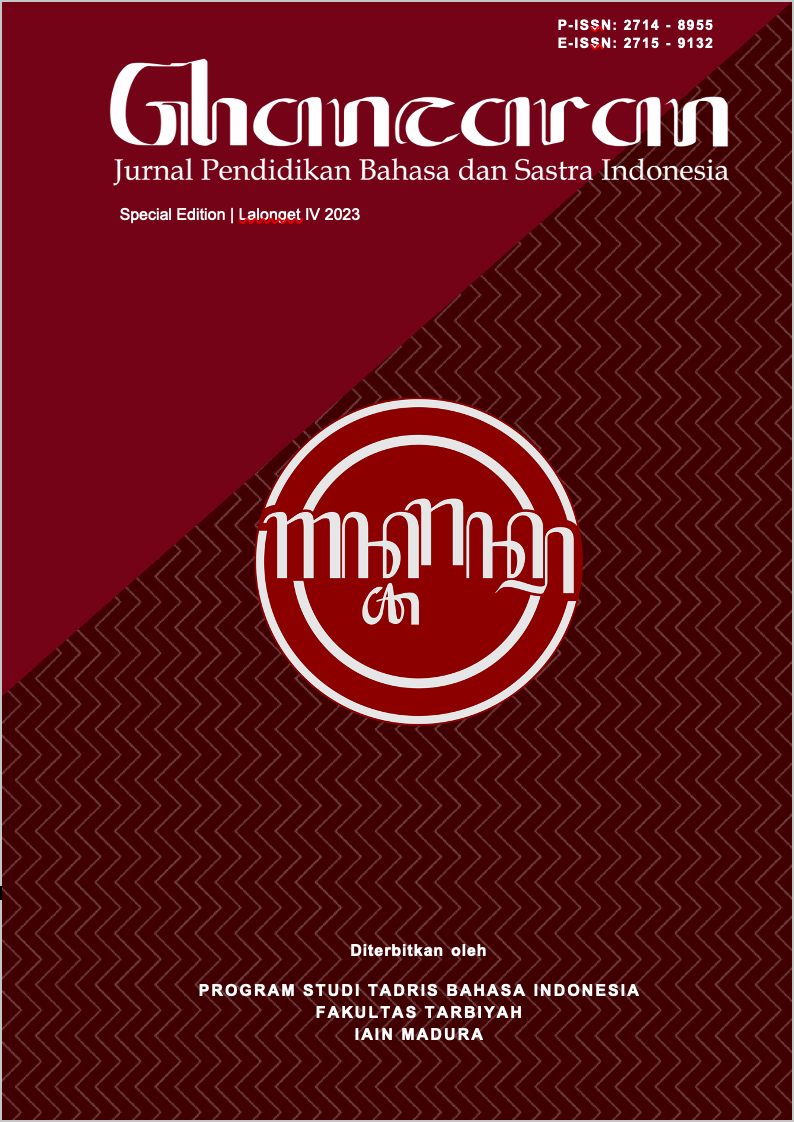Dinamika Teknologi Kecakapan Hidup Sebagai Sinergi Literasi dalam Mengembangkan Writerpreneur di Forum Lingkar Pena
 Abstract views: 191
,
Abstract views: 191
,
 PDF downloads: 163
PDF downloads: 163
Abstract
The speed and up-to-dateness of communication and information have become essential demands in the era of Industry 4.0, particularly in the transformative aspect of literacy. In the rapid development of technology and information, there is a significant impact on the social fabric of society. Amidst the onslaught of passive technology, Forum Lingkar Pena advocates for awareness in developing literacy as a financial resource. Furthermore, the technology of life skills plays a central role in fostering writerpreneurs as part of the synergy of literacy. This research examines how technology engages life skills literacy as the core source of success for the writing profession in Forum Lingkar Pena and the literary layers of society. The research results rely on technology as a digital medium that enhances the productivity and relevance of writerpreneurs and disseminates literacy collaborations with grace on social media.
Downloads
References
Audrin, C., & Audrin, B. (2022). Key Factors in Digital Literacy in Learning and Education: a Systematic Literature Review Using Text Mining. Education and Information Technologies, 27 (1), 7395-7419.
Fitriyani., & Nughoro, A. T. (2022). Literasi Digital di Era Pembelajaran Abad 21. El-Mujtama: Junal Pengabdian Masyarakat, 2 (2), 201-208.
Iskandar, A. (2023). Peluang, Tantangan dan Strategi Pengembangan Literasi dan Sumber Daya Manusia Ekonomi Syariah Indonesia. Info Arta 7(1), 18-30.
Karpati, A. (2020). Digital Literary in Education. IITE Policy Brief: UNESCO Institute for Information Technologies in Education.
Kumar S.L., P. 2021. Importance of Life Skill Education and Teachingmethods. JETIR. Vol 8 (2). 2349-5162.
Latip, A., & Sutantri, N. (2021). Profil Literasi Digital Siswa Kelas XI Pada Pembelajaran Jarak Juah Mata Pelajaran Kimia. Jurnal Pendidikan, 22(1), 32-42.
Mufidah, M. K. (2023). Peran Content Creator Media Sosial dalam Perspektif Sosiologi Komunikasi di Era Endemi Covid-19. Jurnal Dinamika, 4 (1), 33-52.
Nudiati, D., Sudiapernama, E. (2020). Literasi sebagai Kecakapan Hidup Abad 21 Pada Mahasiswa. Indonesia Journal of Learning Education and Counseling, 3(1), 34-40.
Octaviani, I.S., Pricilla, L., Karolina., Widowati., & Purnama, A. Literasi Digital Cerdas dan Bijak Menggunakan Media Sosial Pada Remaja Karang Taruna Desa Cicalengka Kecamatan Pagedangan Kabupaten Tanggerang – Banten. Dedikasi PKM Unpam, 3 (1), 90-95.
Pangrazio, L., Godhe, A., & Ladesma, A. G. L. (2020) What is Digital Literary? A Comparative review of Publications Across Three Language Contexts. E-Learning and Digital Media, 17(6) 442-459.
Pranajaya, N. K., Rachman, R. S. (2022). Strategi Komunikasi Copywriter dalam Pemasaran Konten (Analisis Studi Kasus di Instagram Napak Jagat Pasundan). Buana Komunikasi, 3 (2) 83-93.
Rinekso, A., B. 2021. The Representation of 21 th Century Skills in an Indonesia Efl Textbook. LLT Journal: A Journal on Language and Language Teaching. Vol 24 (1). 191-121.
Sungsup Ra., Shrestha, U., Khatiwadsa, S. 2019. The Rise of Technology and Impact on Skills. International Journal of Training Research. Vol (17). 26-40.
Syabaruddin, A., & Imamudin. (2022). Implementasi Literasi Digital di Kalangan Mahasiswa. Jurnal Eduscience (JES), 9 (3), 942-950.
Tarigan, A. A. (2022). Peran Copywriting Media Sosial dalam Meningkatkan Minat Konsumen Terhadap Produk West Burger. Jurnal Ilmiah Mahasiswa Ilmu Sosial dan Politik (JIMSIPOL), 2 (3), 1-10.
Copyright (c) 2023 GHANCARAN: Jurnal Pendidikan Bahasa dan Sastra Indonesia

This work is licensed under a Creative Commons Attribution-ShareAlike 4.0 International License.
Ghancaran: Jurnal Pendidikan Bahasa dan Sastra Indonesia uses an Open Access Policy under the Creative Commons Attribution-ShareAlike 4.0 International License. Authors publishing in this journal agree to the following terms:
- Ghancaran Journal holds the copyright and grants the journal rights for first publication with the work simultaneously licensed under a

The work is distributed under Creative Commons Attribution-ShareAlike 4.0 International License which allows others to share, copy, and redistribute the material in any media or format and adapt, remix, change, and develop the material even for commercial purposes, as long as it is stated credit and license derivative works under similar terms. - Authors may make additional contractual arrangements for non-exclusive distribution of the journal's published work version.
- Authors are permitted to post their work online (e.g., in institutional repositories or on their websites) before and during submission, as doing so may lead to productive exchange.



















